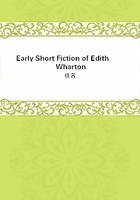
第31章
"Nothing has happened--perhaps that is just the worst of it. You always HATED, you know," she added incoherently, "to have things happen: you never would let them."
"And now--?"
"Well, that was what she came here for: I supposed you had guessed. To know if anything had happened."
"Had happened?" He gazed at her slowly. "Between you and me?" he said with a rush of light.
The words were so much cruder than any that had ever passed between them that the color rose to her face; but she held his startled gaze.
"You know girls are not quite as unsophisticated as they used to be. Are you surprised that such an idea should occur to her?"
His own color answered hers: it was the only reply that came to him.
Mrs. Vervain went on, smoothly: "I supposed it might have struck you that there were times when we presented that appearance."
He made an impatient gesture. "A man's past is his own!"
"Perhaps--it certainly never belongs to the woman who has shared it. But one learns such truths only by experience; and Miss Gaynor is naturally inexperienced."
"Of course--but--supposing her act a natural one--" he floundered lamentably among his innuendoes--"I still don't see--how there was anything--"
"Anything to take hold of? There wasn't--"
"Well, then--?" escaped him, in crude satisfaction; but as she did not complete the sentence he went on with a faltering laugh:
"She can hardly object to the existence of a mere friendship between us!"
"But she does," said Mrs. Vervain.
Thursdale stood perplexed. He had seen, on the previous day, no trace of jealousy or resentment in his betrothed: he could still hear the candid ring of the girl's praise of Mrs. Vervain. If she were such an abyss of insincerity as to dissemble distrust under such frankness, she must at least be more subtle than to bring her doubts to her rival for solution. The situation seemed one through which one could no longer move in a penumbra, and he let in a burst of light with the direct query: "Won't you explain what you mean?"
Mrs. Vervain sat silent, not provokingly, as though to prolong his distress, but as if, in the attenuated phraseology he had taught her, it was difficult to find words robust enough to meet his challenge. It was the first time he had ever asked her to explain anything; and she had lived so long in dread of offering elucidations which were not wanted, that she seemed unable to produce one on the spot.
At last she said slowly: "She came to find out if you were really free."
Thursdale colored again. "Free?" he stammered, with a sense of physical disgust at contact with such crassness.
"Yes--if I had quite done with you." She smiled in recovered security. "It seems she likes clear outlines; she has a passion for definitions."
"Yes--well?" he said, wincing at the echo of his own subtlety.
"Well--and when I told her that you had never belonged to me, she wanted me to define MY status--to know exactly where I had stood all along."
Thursdale sat gazing at her intently; his hand was not yet on the clue. "And even when you had told her that--"
"Even when I had told her that I had HAD no status--that I had never stood anywhere, in any sense she meant," said Mrs. Vervain, slowly--"even then she wasn't satisfied, it seems."
He uttered an uneasy exclamation. "She didn't believe you, you mean?"
"I mean that she DID believe me: too thoroughly."
"Well, then--in God's name, what did she want?"
"Something more--those were the words she used."
"Something more? Between--between you and me? Is it a conundrum?" He laughed awkwardly.
"Girls are not what they were in my day; they are no longer forbidden to contemplate the relation of the sexes."
"So it seems!" he commented. "But since, in this case, there wasn't any--" he broke off, catching the dawn of a revelation in her gaze.
"That's just it. The unpardonable offence has been--in our not offending."
He flung himself down despairingly. "I give it up!--What did you tell her?" he burst out with sudden crudeness.
"The exact truth. If I had only known," she broke off with a beseeching tenderness, "won't you believe that I would still have lied for you?"
"Lied for me? Why on earth should you have lied for either of us?"
"To save you--to hide you from her to the last! As I've hidden you from myself all these years!" She stood up with a sudden tragic import in her movement. "You believe me capable of that, don't you? If I had only guessed--but I have never known a girl like her; she had the truth out of me with a spring."
"The truth that you and I had never--"